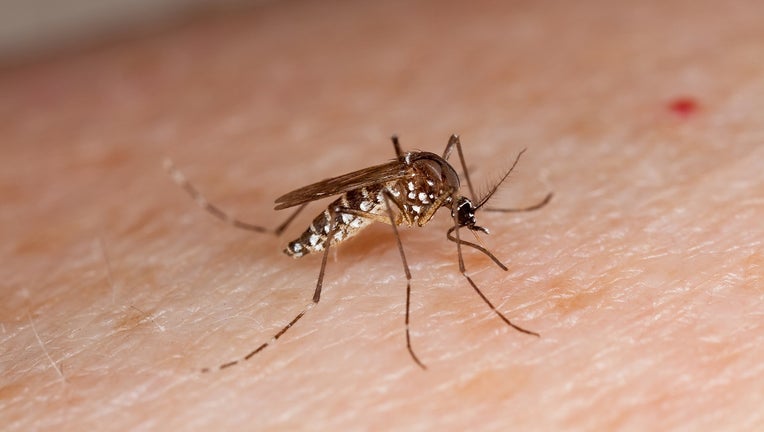Michigan reports 3 new cases of mosquito-borne EEE in horses

(Photo by Stephen Ausmus/USDA)
GENESSEE COUNTY, Mich. (FOX 2) - Three new cases of Eastern Equine Encephalitis (EEE) in Michigan horses were reported Tuesday.
According to the Michigan Department of Agriculture and Rural Development, one horse in Genesee County and two horses in Shiawassee County had the illness, which is passed on by mosquitoes.
More: Michigan confirms first 2021 case of EEE
This is the eighth animal case in 2021. Other cases include a deer in Livingston County and horses in Barry, Genesee, Livingston, Otsego, and Shiawassee counties.
No human cases have been reported this year. However, state officials warn that because this fall has been mild, people need to be careful about the virus, which is one of the most dangerous mosquito-borne diseases in the United States.
Until temperatures fall below 28 degrees for several hours, the risk of being bitten by mosquitoes remains.
"When combatting EEE, the date on the calendar is not as important as the temperatures being experienced," said State Veterinarian Nora Wineland, DVM. "Our current mild temperatures mean horse owners should not ease up on taking precautions, including vaccination. Since the mortality rate of EEE in horses can be as high as 90%, it is important for owners to work with their veterinarian to ensure their animals are properly vaccinated."
Tips for protecting animals:
- Talking to a veterinarian about vaccinating horses against EEE.
- Placing horses in a barn under fans (as mosquitoes are not strong flyers) during peak mosquito activity from dusk to dawn.
- Using an insect repellant on the animals approved for the species.
- Eliminating standing water on the property—i.e., fill in puddles, repair eaves, and change the water in buckets and bowls at least once a day.
- Contacting a veterinarian if a horse shows signs of the illness: mild fever and stumbling, which can progress to being down and struggling to stand.
"Michiganders need to continue taking precautions against mosquitoes as they take advantage of our current mild weather conditions and enjoy outdoor activities," said Dr. Natasha Bagdasarian, chief medical executive at the Michigan Department of Health and Human Services. "People can also be infected with EEE from the bite of a mosquito carrying the virus, which can lead to serious health impacts and even death."
Tips for humans:
- Applying insect repellents containing the active ingredient DEET (or other U.S. Environmental Protection Agency-approved products) to exposed skin or clothing, and always following the manufacturer’s directions for use.
- Wearing long-sleeved shirts and long pants when outdoors. Applying insect repellent to clothing to further prevent bites.
- Maintaining window and door screening to help keep mosquitoes outside.
- Emptying water from mosquito breeding sites around the home, such as buckets, unused children’s pools, old tires, or similar sites where mosquitoes may lay eggs.
- Using nets and/or fans over outdoor eating areas.

